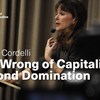trusted
Rainer Forst: Towards a Critical Theory of Trust
Venue: Holländargatan 13, Stockholm Research seminar with Rainer Forst, Professor of Political Theory and Philosophy at the Department of Political Science and Department of Philosophy, Johann Wolfgang
Political trust and public support for climate policy in Europe: The role of perceptions about politicians' competence and integrity
Environmental Research Communications Abstract While previous studies on the relationship between political trust and support for climate policy have focused on the evaluative component of trust, namely
Charles Manski: Seminar with a skeptic
Charles F. Manski On the 21st and 22nd of January this year Charles F Manski was in Stockholm, invited by the Institute for Futures studies to hold three lectures on his newly published book Public Poli.
Ernst Fehr on the individual and society at seminar
Ernst Fehr On the 7th of December 2012 the tipped Nobel Prize-candidate and Professor of Economics Ernst Fehr came to visit the Institute for Futures Studies in order to hold the seminar "The Weave of
Against the De Minimis Principle
Risk Analysis, https://doi.org/10.1111/risa.13445 Abstract According to the class of de minimis decision principles, risks can be ignored (or at least treated very differently from other risks) if the ri
"Try to Balance the Baseline": A comment on "Parent-teacher meetings and student outcomes: Evidence from a developing country" by Islam (2019)
European Economic Review Abstract Islam (2019) reports results from a cluster randomized field experiment in Bangladesh that examines the effects of parent–teacher meetings on student test scores in pri
Debunking and Disagreement
Noûs, (Early View), DOI: 10.1111/nous.12135. Introduction A familiar way of supporting skeptical doubts about the beliefs in some area, such as ethics orreligion, is to provide a “debunking argument” agaiway is to appeal to the disagreement that occurs in the area.2 These types of challenge areoften treated separately and there is not much overlap in the literature they have given rise to.Yet, as they pursue the same conclusion—that the target beliefs are not (fully) justified andthat we should reduce our confidence in them—one might well wonder how they are related.Are they entirely independent or do they interact in non-trivial and interesting ways? That isthe question I shall explore.
Women in violent extremism in Sweden
Nordic Council of Ministers, 54 pages Women have generally been treated as “side shows” in the literature on war,terrorism and violent extremism and have thus been given scant scholarly attention.In mato be framed as unwitting, passive agents or brainwashed victims pulled into violentextremist movements only through the relations of their husbands, boyfriends, orfathers.

Chiara Cordelli: The Wrong of Capitalism Beyond Domination
Political philosophy is witnessing a revival of critiques of capitalism. Against those who argue that capitalism is unjust because of (i) its distributive outcomes, (ii) the oppression of workers at t
Implicit bias, epistemic injustice, and pragmatic stereotypes
The Philosophical Quarterly Abstract Members of stigmatized social groups are often treated unjustly in conversation. Fricker’s influential work on epistemic injustice addresses this topic, according to








